Overview
Have you ever wondered how the world of B2B digital commerce is changing, especially for equipment manufacturers? The article "10 Trends Shaping B2B Digital Commerce for Equipment Manufacturers" dives into this evolving landscape and highlights some key trends that are making waves.
For instance, mobile optimization is becoming crucial. With more people accessing information on their phones, manufacturers need to ensure their platforms are user-friendly on mobile devices. Additionally, headless commerce is on the rise, allowing for greater flexibility in how products are presented online.
But that’s not all! AI-driven insights are transforming how businesses understand their customers, providing valuable data that can enhance engagement. And let’s not forget about sustainability—today’s consumers are increasingly looking for eco-friendly options, which means manufacturers must adapt to meet these expectations.
So, what does this all mean for manufacturers? It’s clear that adapting strategies is essential for enhancing customer engagement and driving growth in a competitive market. Are you ready to embrace these trends and take your business to the next level?
Introduction
As the world of B2B digital commerce keeps changing, equipment manufacturers find themselves navigating a sea of trends that could transform how they operate and interact with customers. Have you ever wondered how innovative platforms like GenAlpha Technologies' Equip360 and the rise of omnichannel strategies can open new doors for growth and efficiency? In this article, we’ll explore ten pivotal trends that promise just that. But here’s the big question: how can businesses not only keep up with these advancements but truly exceed the expectations of today’s savvy B2B buyers? Let’s dive in and find out!
GenAlpha Technologies: Revolutionizing B2B Digital Commerce with Equip360
GenAlpha Technologies is leading the charge in through its innovative platform, Equip360. This solution not only streamlines but also boosts , making it easier for manufacturers and distributors to . Plus, Equip360 integrates seamlessly with existing ERP systems, ensuring a smooth transition for businesses looking to enhance their digital capabilities.
By focusing on user satisfaction, Equip360 helps clients deliver a , which ultimately fosters growth and keeps customers happy. Did you know that companies using report an average return on investment of 134% on their digital spending? That really highlights how effective this platform can be! And success stories, like PartsSource's 10% increase in on-time shipping accuracy, further validate Equip360's impact in the competitive landscape of digital commerce.
As the B2B market evolves—projected to reach a whopping $3 trillion by 2027—Equip360 stands out as an essential tool for manufacturers aiming to thrive in the world of [B2B digital commerce](https://demandsage.com/b2b-marketing-statistics). Kristina Harrington, CEO of GenAlpha Technologies, puts it perfectly: " are crucial for producers to succeed in a competitive environment." This really reinforces just how important the platform is for businesses today.
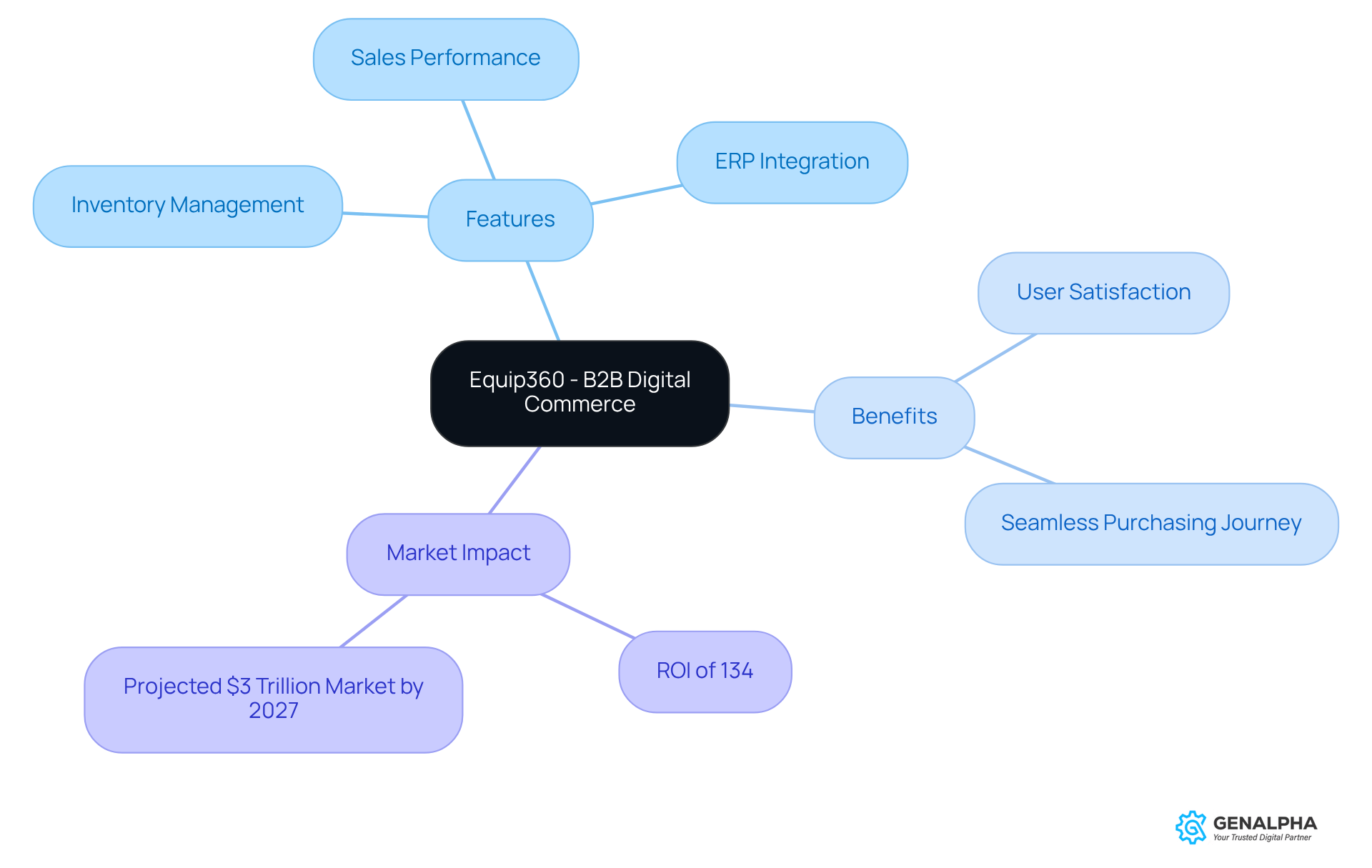
Headless Commerce: Enhancing Flexibility and Customization in B2B Transactions
is shaking things up in the B2B world! By separating the front-end interaction from back-end operations, it gives the power to craft that really cater to their clients' needs. This flexibility means businesses can quickly adapt to without having to overhaul their entire system.
For example, by using APIs, companies can easily integrate various functionalities, which really boosts the and encourages deeper engagement. Today’s consumers are more sophisticated and demanding than ever, seeking . This is where headless commerce shines for manufacturers and distributors, allowing them to deliver unique solutions that meet their clients' expectations. And let’s be honest, a —research shows that a highly satisfied client can generate 2.6 times more revenue than someone who’s just somewhat satisfied. That really underscores the in B2B transactions!
As Seth Godin wisely puts it, "Don't seek buyers for your products, seek products for your audience." So, if you’re looking to effectively, take a moment to assess your current systems. Where can you customize to better meet the evolving needs of your clients? Let’s dive in and make those changes!
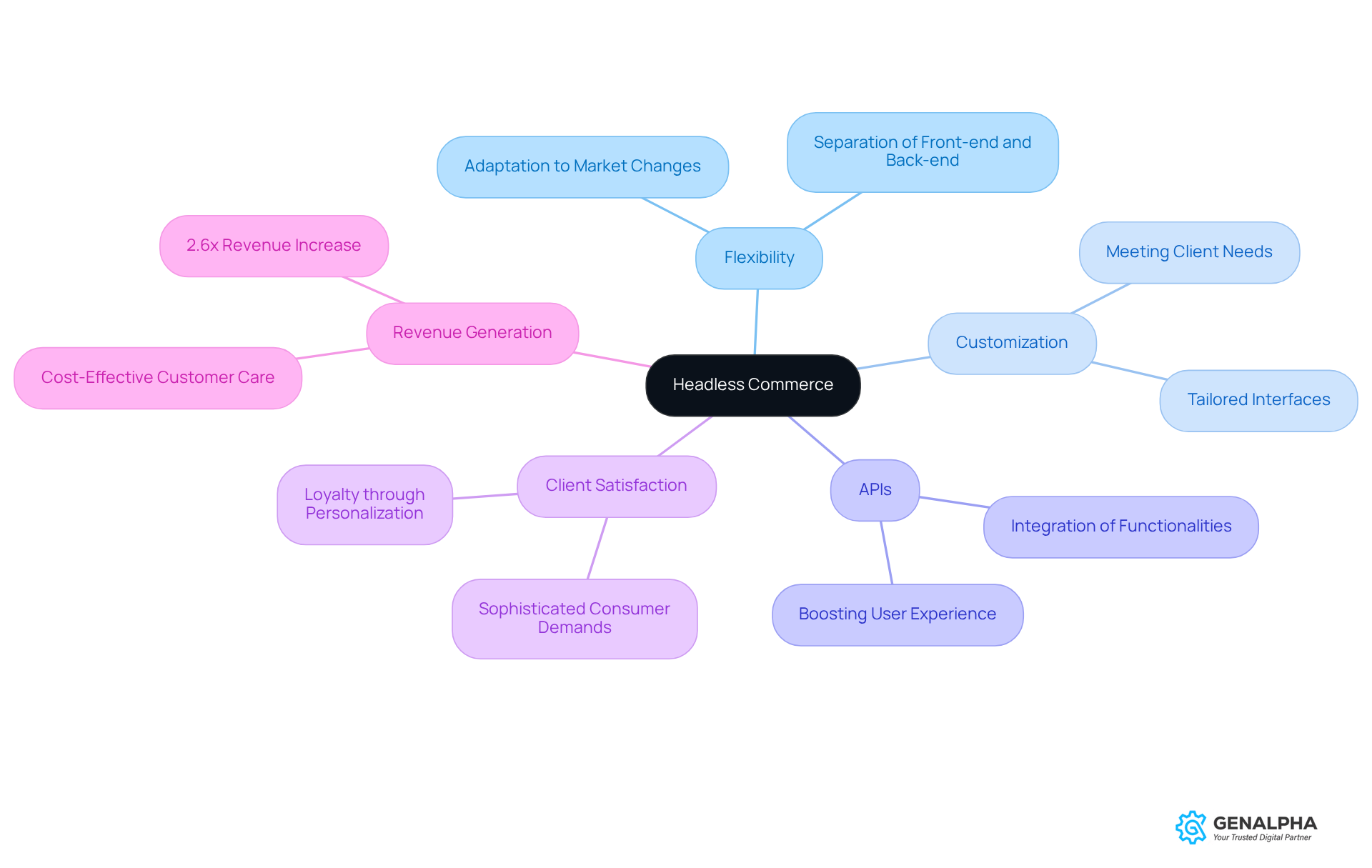
AI-Driven Insights: Leveraging Machine Learning for Enhanced Customer Engagement
Artificial intelligence and machine learning are creating a significant impact in , and it’s pretty exciting! Have you ever wondered how companies really get to know their buyers? By diving into , businesses can fine-tune their and . For example, and sharpen their . Plus, personalized suggestions make the buying experience so much smoother.
This doesn’t just boost ; it also ramps up , making it a must-have for B2B digital commerce in today’s playbook. As organizations start to embrace these technologies more and more, the focus shifts towards crafting . Isn’t it great to think about how this can nurture loyalty and build lasting relationships? So, what’s your take on the future of B2B commerce with AI? Let’s keep the conversation going!
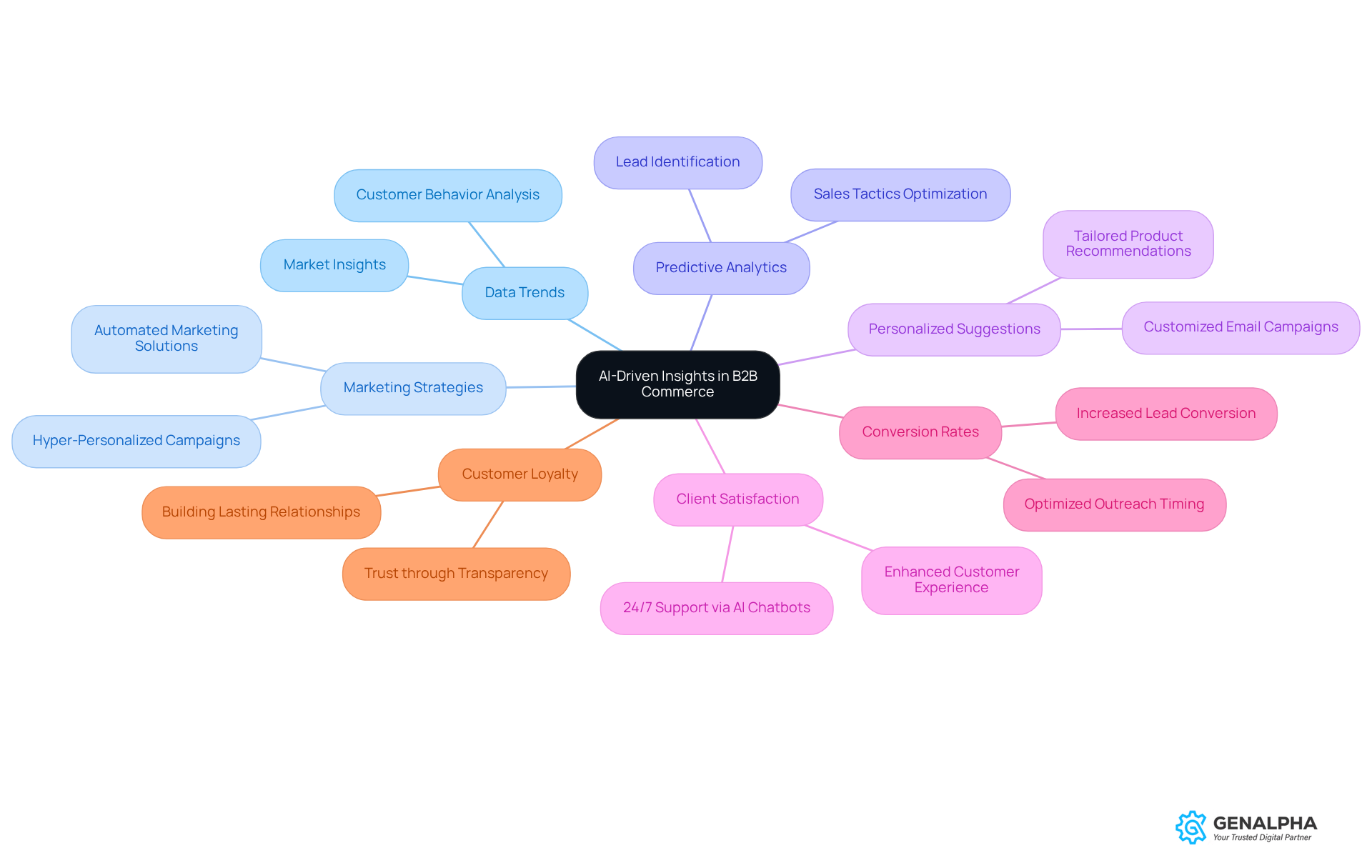
Omnichannel Strategies: Creating Seamless Customer Experiences in B2B
Implementing is crucial for that want to succeed in and provide a seamless interaction. Imagine being able to connect with a brand effortlessly—whether online, in-person, or on your mobile device. This approach ensures that your interactions are consistent and satisfying. By effectively blending sales, marketing, and support services, companies can create a cohesive experience in B2B digital commerce that meets client expectations.
But why does this matter? Well, ! They love having the flexibility to engage with a brand on their terms. In fact, studies show that firms with strong omnichannel interactions see a 9.5% increase in yearly revenue, according to McKinsey. That’s a pretty compelling reason to prioritize , right? Additionally, Forrester highlights that 84% of businesses improving their through B2B digital commerce report increased revenue, demonstrating a clear link between and .
So, if you’re in the game and looking to adopt these strategies, start with a thorough evaluation of your current client touchpoints. This can provide valuable insights into areas where you can enhance the experience. What do you think could be ?
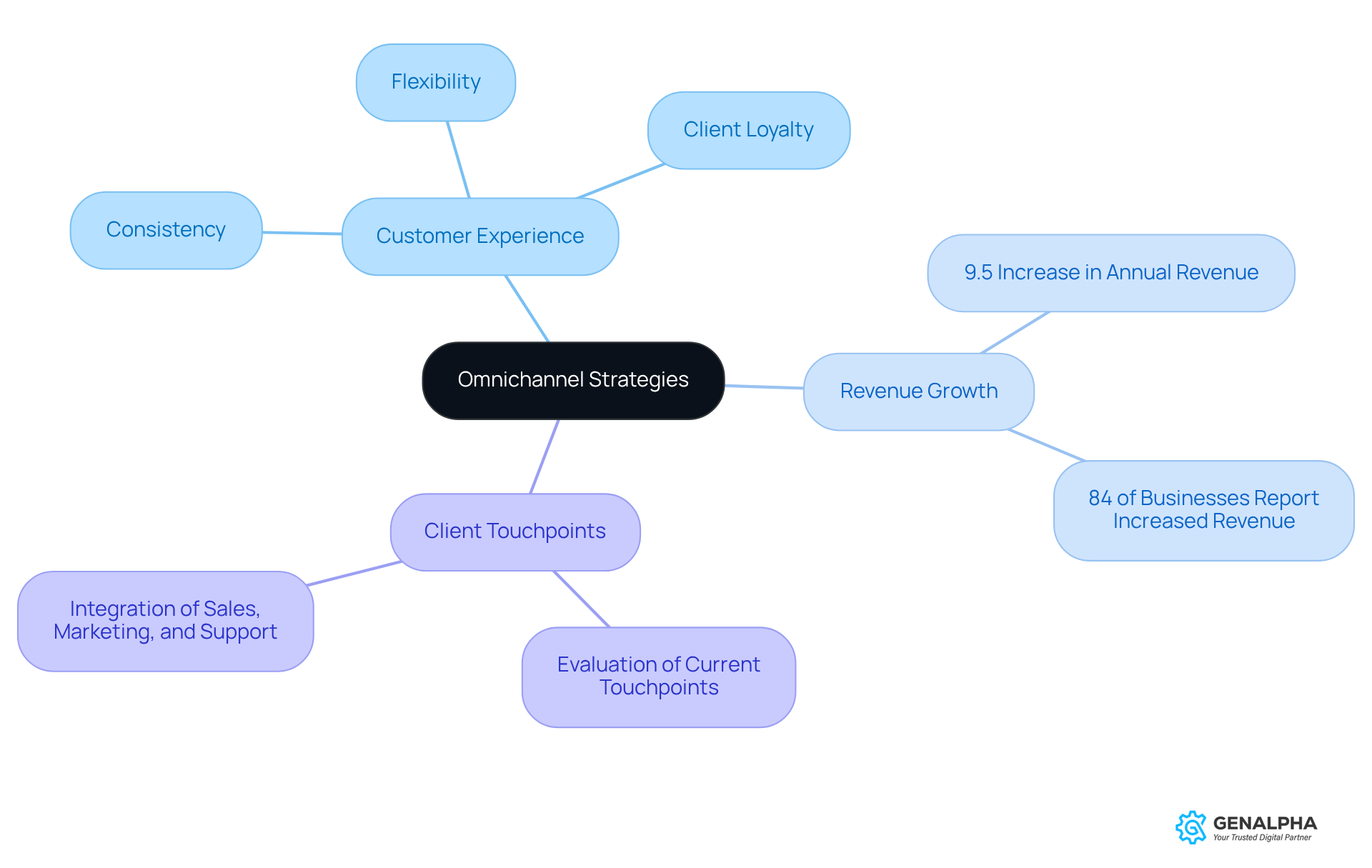
Sustainability Focus: Meeting the Demand for Eco-Friendly B2B Solutions
As environmental concerns heat up, B2B companies are putting in their operations. Why? Because clients are demanding more than ever. Did you know that 76% of consumers would stop buying from companies that overlook environmental, employee, or community well-being? It’s a big deal! Businesses that jump on the sustainability bandwagon—think minimizing waste, optimizing supply chains, and using renewable resources—can really boost their brand reputation and attract clients who care about the planet.
By weaving sustainability into their operations, manufacturers and distributors not only comply with regulations but also snag a . For example, sustainable products are growing 2.7 times faster than conventional ones, showing just how much potential there is for eco-friendly solutions. Plus, adopting these practices can lead to and increased consumer loyalty—88% of people show greater allegiance to companies that support social or environmental causes.
It’s worth noting that 90% of S&P 500 companies now release ESG reports, signaling a growing recognition of . Take Aesop, for instance; they’ve managed to by up to 86% on certain routes. In this ever-changing landscape, committing to sustainability is becoming a key part of successful B2B digital commerce, rather than just a trend. And with ESG investments projected to hit $33.9 trillion by 2026, the are becoming hard to ignore. So, what are you waiting for? Let’s make sustainability a priority!
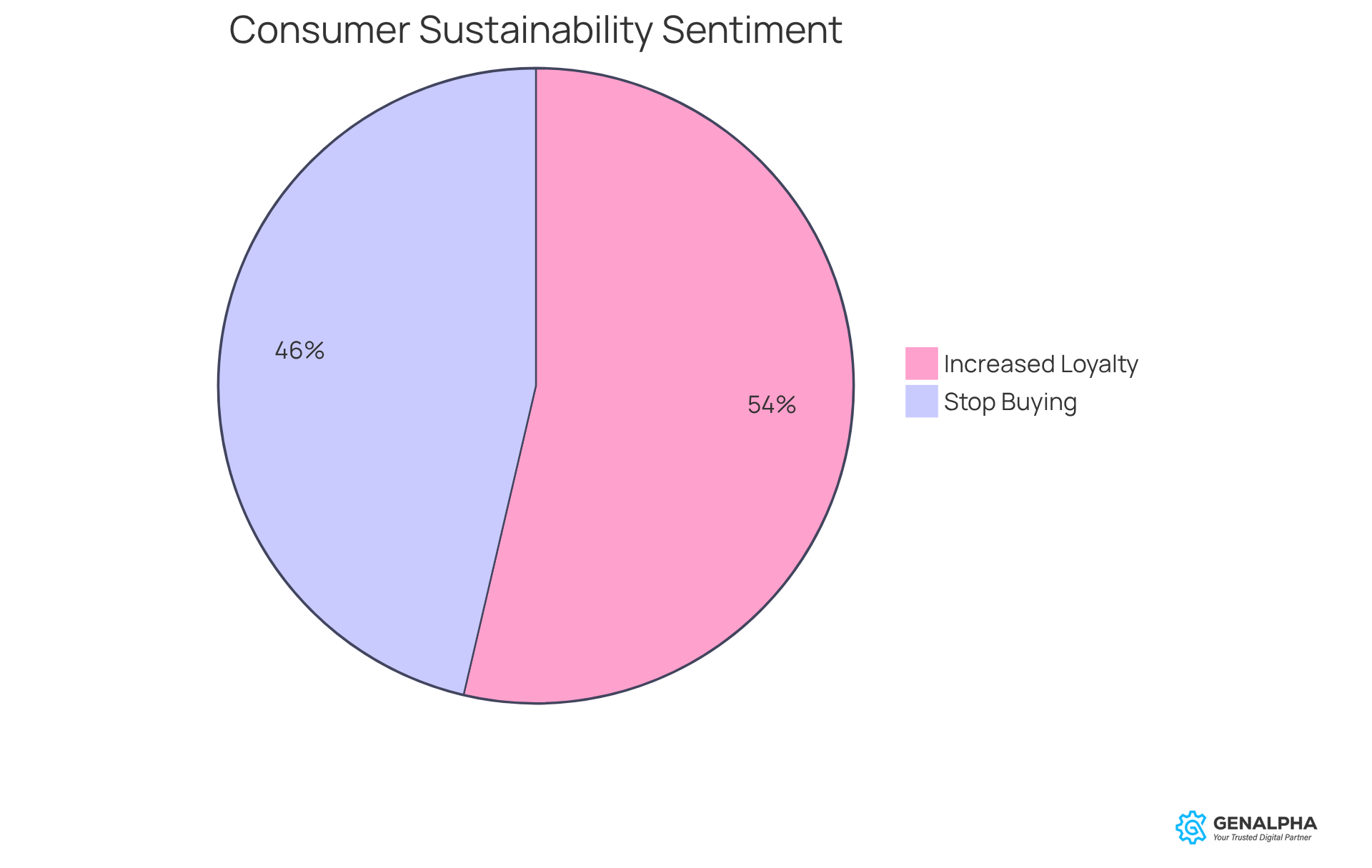
B2B Marketplaces: Expanding Opportunities for Business Transactions
is driving the emergence of as essential platforms for manufacturers, suppliers, and buyers to connect. Imagine a centralized hub where businesses can showcase their products, making it super easy for buyers to find what they need. By diving into these marketplaces, companies can expand their reach and , tapping into new client segments that were once out of reach.
This trend is a game-changer for and strengthen their presence in B2B digital commerce. With the expected to hit a whopping $32.11 trillion by 2025, growing at a CAGR of 14.5%, the growth potential here is huge! Plus, did you know that 87% of B2B clients are willing to pay more for personalized experiences? This really highlights how important are in these marketplaces.
As manufacturers leverage , they enhance their and build stronger relationships with their clients, paving the way for . So, to make the most of these opportunities, manufacturers should explore that align with their product offerings and target demographics. What marketplace will you explore next?
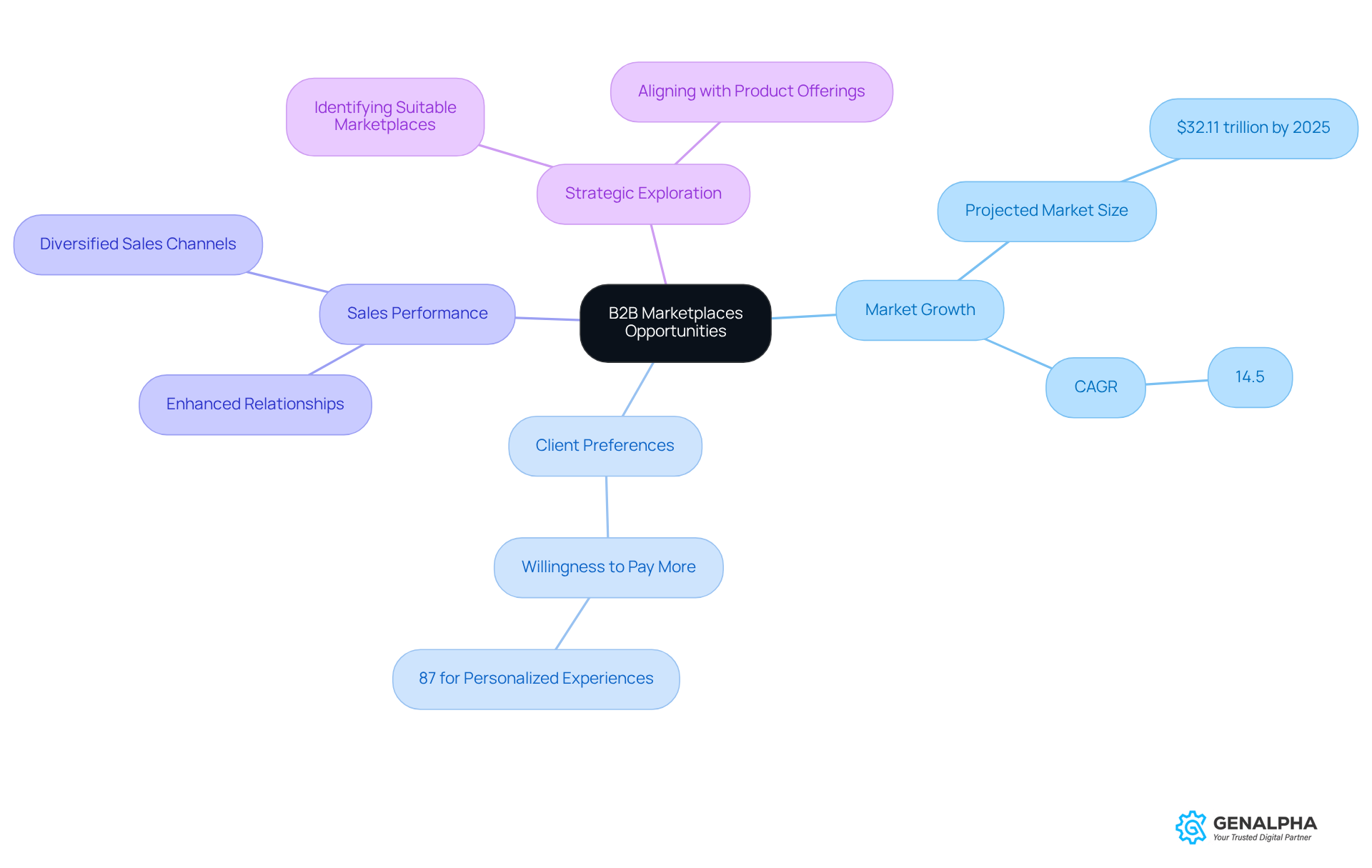
Personalization: Tailoring B2B Experiences to Meet Customer Needs
Personalization has become essential in B2B digital commerce. Clients are increasingly looking for that make them feel special. By harnessing data analytics, businesses can uncover valuable insights into what clients really want and how they behave, enabling them to just right. Think about , targeted marketing campaigns, and unique pricing strategies. When businesses execute such , it doesn’t just enhance the client journey; it builds loyalty, making customers feel recognized and valued by the brands they interact with.
For instance, tailored product suggestions can boost conversion rates by a whopping 320%! And B2B firms that customize their online interactions see an average order value increase of 40%. Isn’t that impressive? Plus, 86% of B2B clients expect companies to know their personal information during interactions. This expectation underscores the need for brands to adopt a .
As Betsy Utley-Marin puts it, "personalization is no longer a 'nice to have'—it’s what today’s buyers expect." Moreover, 80% of industry leaders agree that consumers tend to spend more when their experience is tailored. This highlights the . As we navigate the ever-evolving digital landscape, prioritizing personalization and continually measuring and optimizing these strategies will be crucial for and driving B2B digital commerce. So, how is your business embracing personalization today?
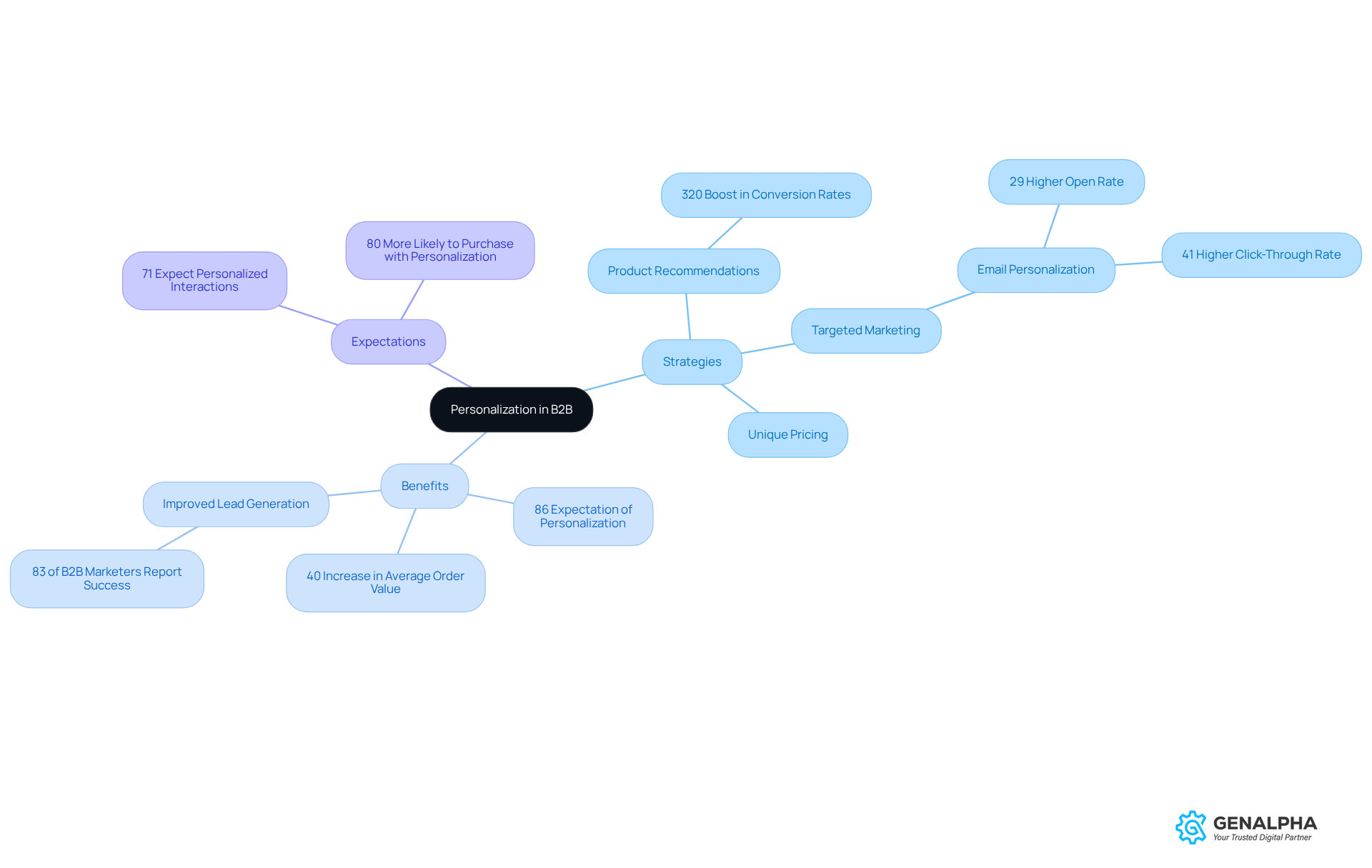
Data Security: Safeguarding B2B Transactions in a Digital Landscape
In today's digital world, , especially in the equipment manufacturing sector. With cyber threats on the rise, it’s crucial for companies to adopt to protect sensitive client information. This means using things like:
- encryption protocols
- multi-factor authentication
- regular security audits
to beef up data defenses. For example, companies like GE Aviation have set up , making data more accessible and usable, which really boosts both operational efficiency and security.
But here’s the kicker: trends show that a whopping 68% of . This highlights the need for . Equipment manufacturers can roll out specific training sessions focused on spotting phishing attempts and keeping sensitive data safe. By , businesses not only comply with regulations but also build trust with their clients. And let’s face it, trust is key—clients are more aware of data privacy issues than ever and expect their partners to uphold high security standards.
Ultimately, a strong commitment to data security can set B2B firms apart in the competitive landscape of B2B digital commerce, enhancing client loyalty and driving growth. So, how is your company prioritizing data security today?
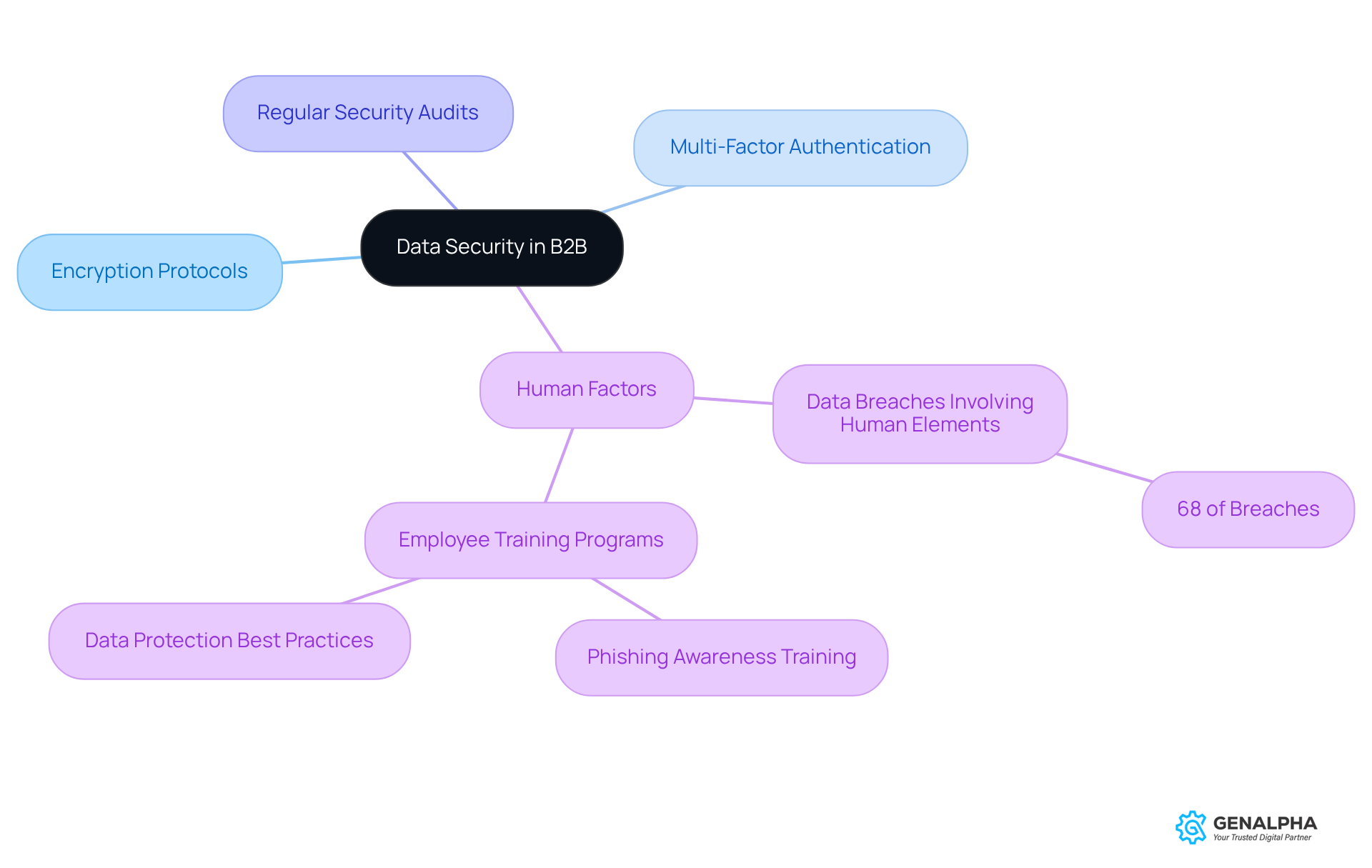
Mobile Optimization: Adapting to the Needs of B2B Buyers on the Go
With the rise of , it’s time for equipment manufacturers to step up their game in mobile optimization. After all, how can you effectively engage customers who are always on the go? Creating across devices is a must. Plus, tailored to the specific needs of your industry is key.
Did you know that 80% of B2B purchasers use mobile devices during their buying journey? This statistic really drives home the importance of addressing this trend. When you enhance mobile experiences, you’re not just making things easier for your customers; you’re also . In fact, 90% of users are likely to return to vendors that offer a positive mobile experience.
For example, companies that have embraced responsive design have seen increased engagement and smoother purchasing processes, which ultimately leads to . In the competitive world of equipment manufacturing, ; it’s essential for your success. So, what are you waiting for? Let’s make sure your mobile strategy is up to par!
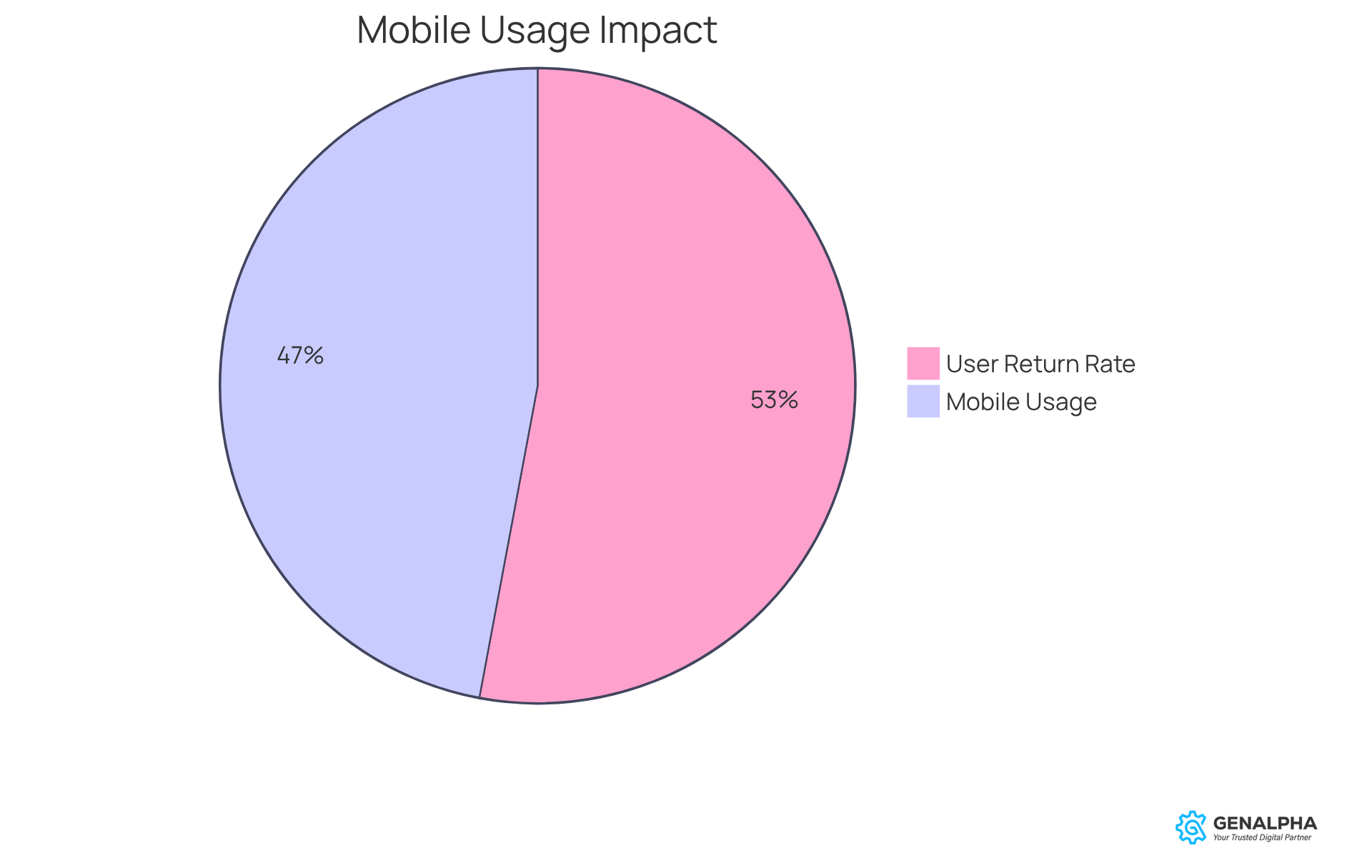
Subscription Models: Transforming Revenue Streams in B2B Commerce
Have you ever thought about how subscription models are shaking up ? They’re not just a trend; they’re a game changer for companies looking to create steady . By offering products or services on a subscription basis, businesses can build long-lasting connections with their clients. This means and loyalty, which is a win-win!
Imagine being able to predict your revenue more accurately and manage your inventory better. Sounds great, right? Clients love the convenience and that come with subscriptions. As more B2B companies jump on the B2B digital commerce subscription bandwagon, those that really nail these models will likely experience and keep their customers coming back for more.
So, if you haven’t considered how a could benefit your business, now might be the perfect time to dive in! What do you think? Could this be the key to unlocking new opportunities for you?
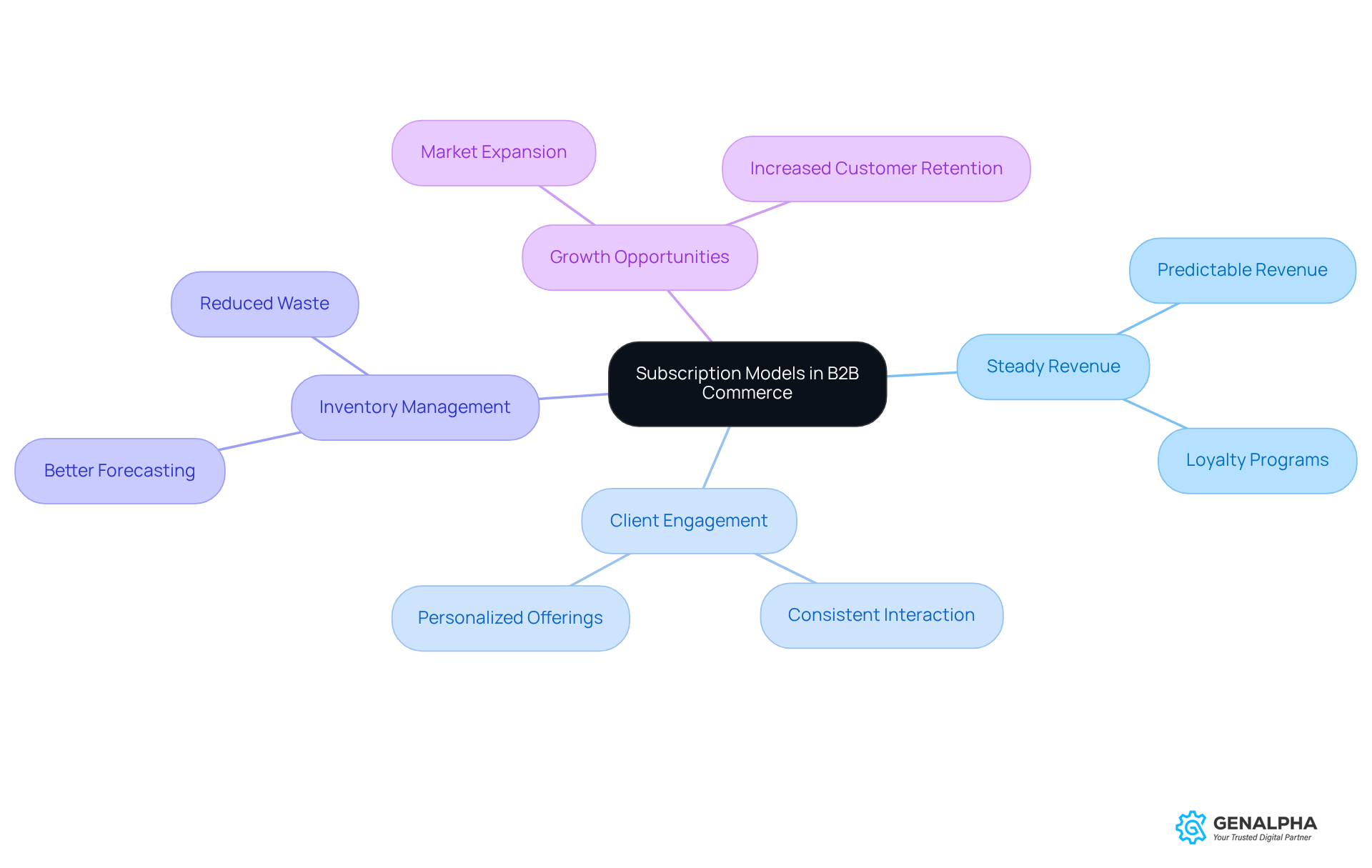
Conclusion
The landscape of B2B digital commerce is really changing, and it’s exciting to see how innovative technologies and evolving customer expectations are driving this shift. For companies in the equipment manufacturing sector, adapting to these trends is crucial. Take Equip360, for instance—it’s a platform that not only enhances efficiency but also boosts sales performance. By embracing strategies like headless commerce, AI-driven insights, and omnichannel approaches, businesses can significantly improve customer engagement and satisfaction. This is essential for staying competitive in a fast-paced market.
So, what are some key takeaways from this shift?
- Personalization
- Sustainability
- Data security
These factors are becoming increasingly important in shaping successful B2B strategies. Clients are demanding tailored experiences and eco-friendly solutions more than ever. Businesses that prioritize these aspects will not only enhance their brand reputation but also build long-lasting loyalty. Plus, the rise of B2B marketplaces and subscription models opens up new avenues for revenue growth and customer connection. Manufacturers should definitely explore these opportunities!
Ultimately, the future of B2B commerce depends on our ability to adapt and innovate. Companies should take a proactive approach in assessing their digital strategies, leveraging technology to create seamless and personalized experiences that meet today’s buyers' demands. By staying ahead of these trends, businesses can thrive in the competitive landscape and positively contribute to the evolving expectations of their clients and the environment. So, are you ready to embrace these changes and take your B2B strategy to the next level?
Frequently Asked Questions
What is Equip360 and how does it benefit B2B digital commerce?
Equip360 is an innovative platform developed by GenAlpha Technologies that streamlines inventory management and boosts digital sales performance for manufacturers and distributors. It integrates seamlessly with existing ERP systems, enhancing digital capabilities and optimizing online sales processes.
How does Equip360 improve customer satisfaction?
Equip360 focuses on user satisfaction by delivering a seamless purchasing journey, which fosters growth and keeps customers happy. Companies using advanced analytics with Equip360 report an average return on investment of 134% on their digital spending.
What are some success stories associated with Equip360?
One notable success story is PartsSource, which experienced a 10% increase in on-time shipping accuracy after implementing Equip360, highlighting the platform's effectiveness in the competitive landscape of digital commerce.
What is headless commerce and how does it benefit B2B transactions?
Headless commerce separates the front-end interaction from back-end operations, allowing manufacturers and distributors to create customized interfaces tailored to their clients' needs. This flexibility enables businesses to quickly adapt to market changes without overhauling their entire system.
How does headless commerce enhance customer engagement?
By using APIs, companies can integrate various functionalities that improve the user experience and encourage deeper engagement. Personalized solutions are essential in meeting the sophisticated demands of today’s consumers, leading to increased client satisfaction and loyalty.
What role does artificial intelligence play in B2B digital commerce?
Artificial intelligence and machine learning are used to analyze data trends, helping businesses refine their marketing strategies and improve client interactions. Predictive analytics can identify potential leads and enhance sales tactics, ultimately boosting conversion rates.
How can AI-driven insights impact customer loyalty?
By crafting personalized interactions based on data-driven insights, businesses can nurture loyalty and build lasting relationships with clients. This approach not only enhances client satisfaction but also increases the likelihood of repeat business.




